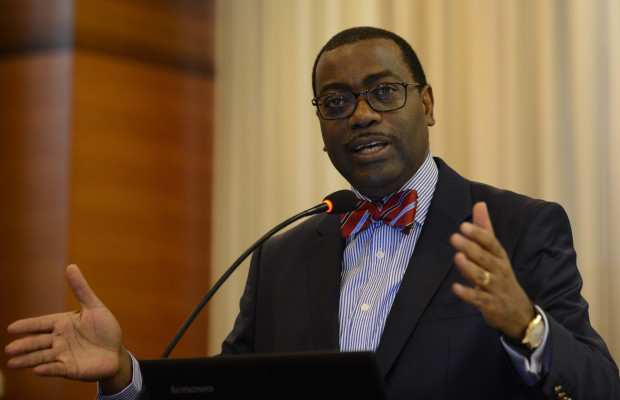Quality of life on rise for many Africans, report says

African Development Bank (ADB) President Akinwumi Adesina gestures as he addresses a press conference in Ahmedabad on May 20, 2017, ahead of the ADB Annual General Meeting.
The African Development Bank will hold its 52nd Annual General Meeting in the western Indian state of Gujarat from May 22-26, the first time the event has been held in India. Some 4500 delegates including Finance Ministers and Central Bank Governors from the organisations 54 member countries and 26 non-member countries are expected to attend. AFP
Africans are seeing a steady improvement in the quality of their lives, with some countries even nearing world averages, says a wide-ranging report out Monday on the continent’s future.
While large portions of the continent’s 1.2 billion people live in poverty, many of Africa’s 54 nations have made significant progress in health, education and standard of living.
“At least a third of African countries have now achieved medium to high levels of human development,” said the report published by the African Development Bank, referring to a composite measure of a nation’s condition.
“North Africa has the highest levels, approaching the world average, but all sub-regions have seen steady improvement” since the turn of the 21st century, it added.
Despite the advances, some 544 million Africans still live in poverty, according to the report titled “African Economic Outlook 2017”.
Article continues after this advertisementRwanda recorded the most progress, followed by Ghana and Liberia in the fight against poverty since 2005. One of Rwanda’s key efforts was a community-based health insurance system that by 2010 had covered nearly 9 in 10 of its people.
Article continues after this advertisementAt the same time, north African nations Egypt and Tunisia have health insurance systems that cover 78 percent and 100 percent respectively of their residents.
Spending on education, which is considered key for development, is above six percent of gross domestic product in South Africa, Ghana, Morocco, Mozambique and Tunisia. While Nigeria puts less than one percent of its GDP into schooling.
According to World Bank figures, European Union nations spent an average of 4.9 percent of their GDP on education in 2013.
‘Potential for prosperity’
In central Africa, where school completion rates for girls are the lowest on the continent, the gap with boys is increasingly narrowing. Nearly three times as many girls finished secondary education in 2014 than a decade prior.
Gender equality is on the rise in several nations — including Botswana, Namibia, Rwanda — where women “achieve almost equal levels of human development as men,” the report said.
While there are bright spots in Africa’s move toward better income, education and health, serious challenges remain in the fight against poverty.
One of the main ones is the lack of access to cooking fuel, electricity and sanitation. The needs may not come as a surprise given some 645 million people in sub-saharan Africa live without electricity.
The future is also not very bright for many of the continent’s young people, nearly half of whom are unemployed. One of the key problems is that many receive an education that does not give them marketable skills.
“The greatest contributor to economic growth is not physical infrastructure, but brainpower, what I refer to as ‘grey matter infrastructure’… Stunted children today leads to stunted economies tomorrow,” African Development Bank President Akinwumi Ayodeji Adesina said in 2016.
The report sees reasons to be hopeful for the economy this year, predicting a 3.4 percent expansion after weak 2.2 percent growth in 2016.
However, the future rebound assumes that “the recovery in commodity prices is sustained, the world economy is strengthened and domestic macroeconomic reforms are entrenched,” the report said.
East Africa remains the continent’s economic powerhouse, driven in large part by Ethiopia. Overall, Africa remains the second most dynamic region in the world behind developing nations in Asia.
The continent’s middle class, which the report estimates at 350 million people, “represents a vast source of potential for prosperity.”